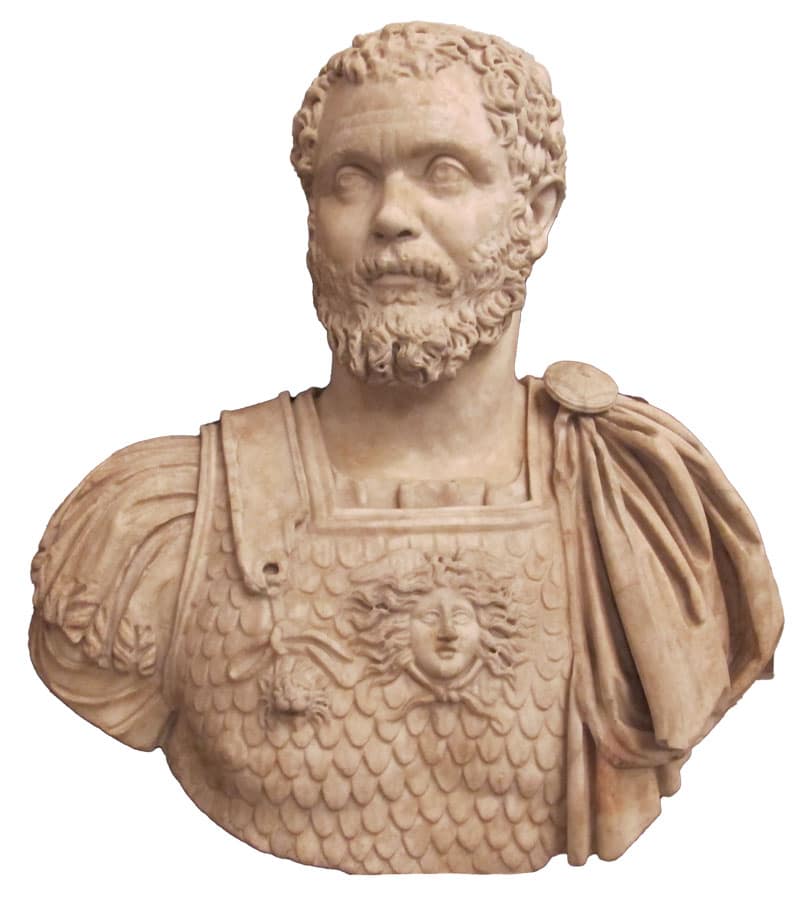Life: AD c. 145 – 197

The birth date of Clodius Albinus is unknown. But most likely he was born sometime between AD 140 and 150 into a wealthy family in Hadrumetum in North Africa.
His early career is largely unknown, but it appears he probably enjoyed an army career before he entered public life as an equestrian.
He became a senator under the reign of Marcus Aurelius and, when governor of Bithynia in AD 175, he remained loyal to the emperor when the unfortunate revolt of Cassius took place in Syria. Under Commodus, Albinus then served along the Danube frontier.
Rise Of Clodius Albinus
In AD 187 he finally achieved the office of consul. This was followed in AD 189 by the position of governor of Lower Germany.
Albinus seems to have been an aristocratic Roman, well at ease with the senate, who liked writing erotic stories and was known to be a bit of a womanizer.
With his soldiers though he was a harsh disciplinarian and ruthless commander. And yet his character was deemed far less cruel than that of his chief opponent Severus.
When in about AD 191 Albinus was made governor of the important military province of Britain with its three legions it was most likely the work of the praetorian prefect Laetus. Plans to rid the empire of its menacing mad emperor Commodus were most likely well underway by then and Clodius Albinus was a safe pair of hands with which to trust such power in an upcoming crisis. Also of course Laetus would have understood him as a fellow African and therefore a natural ally.
When Didius Julianus succeeded Pertinax, Clodius probably supported the new ruler. Most of all he would have enjoyed superb connections with Julianus, whose mother came from Hadrumetum – Albinus’ hometown. With the fall of Julianus, he remained largely on the sidelines. He didn’t immediately intervene, far more he stood by and awaited the outcome of the battle between Septimius Severus and Pescennius Niger. Septimius Severus did early on in his bid for power grant him the position of Caesar.
This would have made him heir to Severus’ throne. But Severus possessed two sons of his own and so it was unlikely that this offer of caesarship was ever anything else than an empty gesture. It is therefore hard to reason why Albinus did not intervene earlier in the race for the throne. He commanded three legions and possessed the support of many senators.
Perhaps he did really believe that Severus intended him as his heir, just as Nerva had once appointed Trajan. Severus even went as far as having coins struck on which he acknowledged Albinus as his successor. And in AD 194 Albinus was granted the consulship by Severus, despite remaining in Britain. Or perhaps Albinus simply misjudged the appropriate time to intervene.
Whatever the truth may be, no sooner had Septimius Severus defeated Pescennius Niger in the east than he made his elder son Caracalla his official heir (AD 195). This was nothing less than a public insult to Albinus, – a challenge.
Fight for the Throne
It might well have been that Severus thought it necessary to lure his foe out of Britain. An assault on Britain with its three legions would have proved very difficult. If it was a trick, it worked. For Albinus responded shortly after, in AD 196, by having himself hailed emperor and setting across from his province in Britain to Gaul with 40’000 men, gathering up more men as he set up his temporary headquarters in Lugdunum (Lyons).
There is no doubt that he was acting from a weaker position than his opponent. Lucius Novius Rufus, the governor of Hispania Tarraconensis declared in Albinus’ favor, which further added the Spanish Legio VII ‘Gemina’ under his command. But Severus controlled the important Danubian forces. And of critical importance in this case – the German legions declared for Severus.
Early on fighting broke out between Albinus’ forces and those under the command of the governor of Lower Germany, Virius Lupus. Albinus was trying to strike a decisive blow to the German forces and force them to change sides. He achieved a victory, yet it proved insufficient and the German legions remained in Severus’ camp.
As Severus was gathering his forces along the Danube, Albinus considered invading Italy. But this move had already been predicted by Severus who had already reinforced the passes over the Alps. This apparently deterred Albinus from risking a significant loss of troops in order to secure the possession of Rome.
When finally Severus arrived with a large army in Gaul in the winter of AD 196/197, he found Albinus surprisingly strong. Whatever Severus’ estimations had been at first the underdog Albinus now was proving a hard nut to crack. The first battle took place at Tinurtium. Severus proved the victor, and yet both knew, that it was anything but a decisive blow.

Death
The decisive battle happened outside Lugdunum (Lyon) on 19 February AD 197. It is said to have been a massive battle (the historian Dio Cassius speaks of up to 150’000 men on either side, though these figures are more than likely exaggerated). For a long time, it hung in the balance, but after two days of fighting, Severus’ cavalry swung it his way, and Albinus’s army suffered a crushing defeat.

Albinus’ death is unclear. Fleeing from the battlefield he made his way to the city of Lugdunum. There he either found his escape routes all cut off and stabbed himself to death, or he was stabbed by an assassin. Whatever the cause of his death, Severus had his naked body laid out on the ground before him, so that he could ride his horse over it, in a final act of humiliation.
If Albinus’ wife and sons were initially pardoned by Severus, he appeared to almost immediately afterward change his mind again. For as the dead Albinus was beheaded, so were they. His headless body was thrown into the Rhine, together with the corpses of his murdered family. Albinus’ severed head was then sent to Rome as a warning to his supporters.
People Also Ask:
How did Clodius Albinus gain power?
Decimus Clodius Albinus ( c. 150 – 19 February 197) was a Roman imperial pretender between 193 and 197. He was proclaimed emperor by the legions in Britain and Hispania after the murder of Pertinax in 193 (known as the “Year of the Five Emperors”).
Who was the Roman general from Tunisia?
Decimus Clodius Septimius Albinus (born, Hadrumetum [modern Sūsah, Tunisia]—died February 19, ad 197, Lugdunum [modern Lyons, France]) was a Roman general, a candidate for the imperial title in the years 193–197.

Historian Franco Cavazzi dedicated hundreds of hours of his life to creating this website, roman-empire.net as a trove of educational material on this fascinating period of history. His work has been cited in a number of textbooks on the Roman Empire and mentioned on numerous publications such as the New York Times, PBS, The Guardian, and many more.
